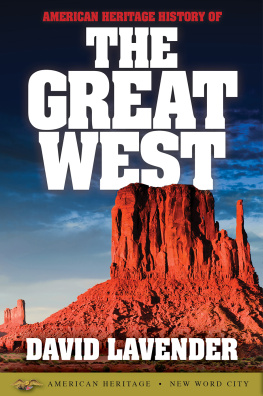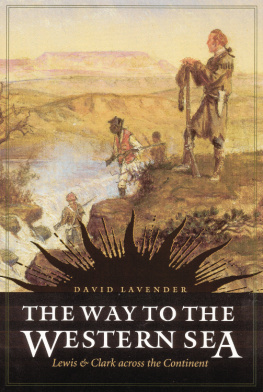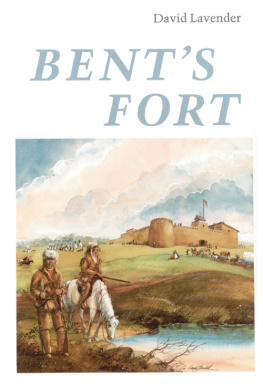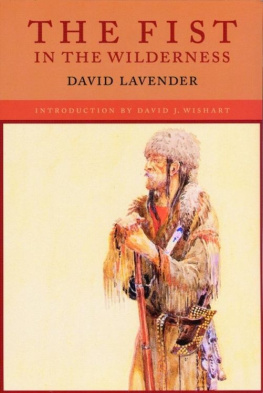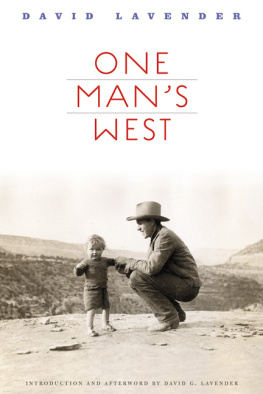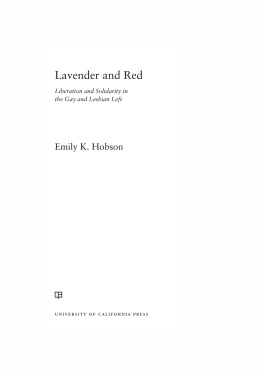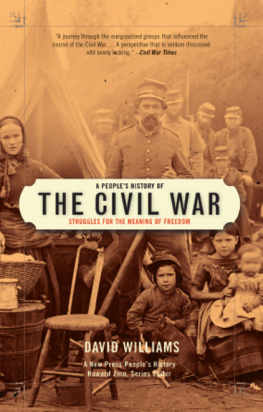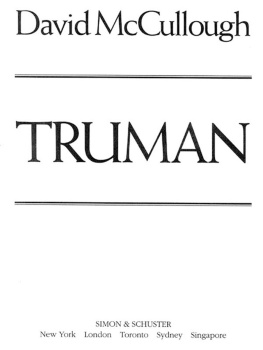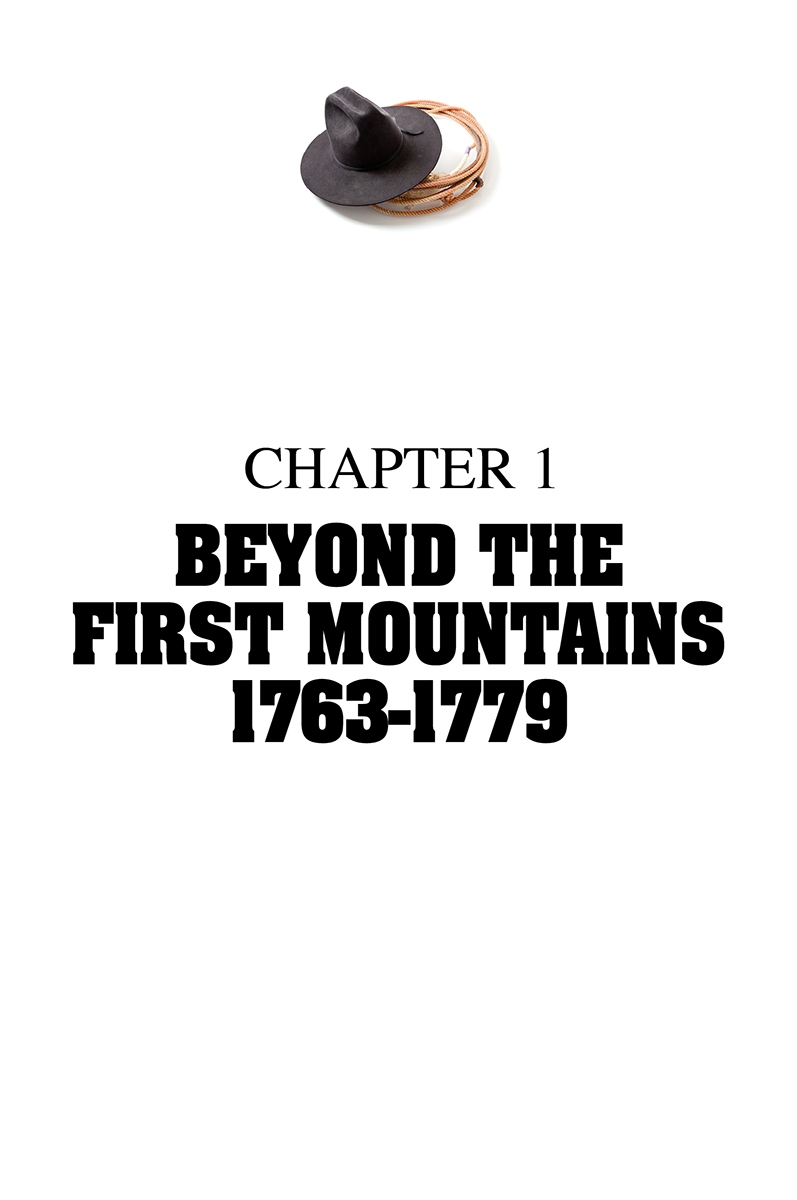Richard Henderson , judge of a back-country court in Colonial North Carolina, possessed, to borrow his own words, a rapturous idea of property. He was not alone. Many Americans of his time, among them Benjamin Franklin , Patrick Henry , and George Washington , were similarly inspired. During the energetic decades preceding the American Revolution (and for many years thereafter), speculation in wilderness land was considered an honorable way of growing wealthy. The dealers main problem, aside from finding suitable areas of a money-making size, lay in outwitting his government.
Richard Hendersons scheme for acquiring vast properties was more ambitious than most, but before we can appreciate its full arrogance, we need to glance at the larger question of early land titles. Exactly who owned the empty lands of North America? Jurists advanced several arguments. In general, they granted Indians rights of possession based on occupancy. Geographical discovery of these Native lands gave the home nation of the discoverer, in most cases either England, France, or Spain, a sort of primary option to purchase the aboriginal titles through treaty, as though each tribe were a sovereign nation whose ideas of property matched those of the Europeans.
This option, vested in the king, could be conveyed by royal charter to the Colonial governments. Colonial administrators then entered into purchase agreements with local Natives and passed the land they acquired on to private owners by means best suited to encourage the spread of settlement. At times, private individuals hurried the matter along by buying land directly from the Natives without waiting for the sanction of a formal treaty. In general, however, this was frowned upon.
During the early years of the American frontier, no one realized how wide the continent really was. As a result, the charters issued to Massachusetts, Connecticut, Virginia, both Carolinas, and Georgia blandly granted to each all the land from its Atlantic frontage west to the Pacific Ocean, subject to the extinguishing of the Indians title.
So long as the French sat glowering in the Ohio and Mississippi valleys, these sea-to-sea pretensions were meaningless. Then, between 1755 and 1763, war and the Peace of Paris ousted the French from the continent and confirmed Englands dominion as far west as the Mississippi. Beyond the Mississippi, Spain blocked any sea-to-sea hopes, but there was plenty of land between the Allegheny Mountains and the river. The Colonies reasserted their old claims, which were modified by the Spanish reality. Virginias was the most sweeping. Ignoring the charters of Connecticut and Massachusetts and the tenuous claims that New York held to the land of the Iroquois , she contended that she controlled not just the area directly west of todays West Virginia and Kentucky - but all of what is now Ohio, Indiana, Illinois, Michigan, Wisconsin, and part of Minnesota as well.
Devising methods of putting these Western lands into the hands of people who would utilize them was a persistent frontier problem. Speculators provided one useful channel. In theory, a group of men formed a company that obtained from the Colonial governors or from the king a reasonably sound title to a stretch of wilderness. Through printed advertisements and sales agents, they lured restless frontiersmen toward the area, broke the holdings into small pieces, and sold the plots at a huge advance in price. The speculators, and even the settlers whose land rose in value, insisted vehemently that whatever increment they gained was well earned. The Western lands were worthless until inhabited. Did not those who opened the country deserve a reward for their foresight and risk?
Many were eager to take the risks. By the middle of the eighteenth century, a voracious land hunger filled the frontier. Nowhere was it stronger than in southern Pennsylvania, birthplace of Daniel Boone , who was soon to be intimately associated with speculator Richard Henderson. Squire Boone, Daniels father, was an impatient man. Blocked by the mountains from an easy shift farther west, he gathered up six of his eight children and several grandchildren and around the year 1750 drifted south with a growing trickle of others seeking the future in the great trough that parallels the eastern base of the Appalachian Mountains - the valley that in Virginia is called Shenandoah . Beyond the Virginia border, in the Yadkin country of North Carolina, the Boones and their fellow migrants met another thrust of people working from South Carolina northward along the rivers that head in the Blue Ridge Mountains and even beyond.
These movers were a new race. They or their parents had been born for the most part in England or its possessions - the hill pockets of Wales, the Highlands of Scotland, or the wild moors of Northern Ireland. With them were a few Huguenots from France and many Germans from the Rhine Palatinate. All but a few were Protestants, the Scotch-Irish in particular deeply tinged with Calvinistic individualism.
The frontier changed some of their characteristics and intensified others. They were, as a group, semiliterate, proud, and cantankerous, as dogged in their insistence on their own way of life as pine roots cracking granite to grow. Perhaps their greatest resource was their capacity to endure. They outlasted recurrent plagues of smallpox and malaria, uncountable Indian raids, and a steady progression of natural accidents. They were incredibly prolific. Squire Boones family of eight children was small by frontier standards. James Robertson , an eventual neighbor of Boones and the founder of Nashville, had eleven children. Twice-married John Sevier , the first governor of Tennessee, fathered eighteen; his longtime enemy, John Tipton , also twice married, produced seventeen.
The entire assets of one of these huge families often amounted, in the beginning, to little more than an axe, a hunting knife, an auger, a rifle, a horse or two, a few cattle and pigs, a sack of seed corn and another of salt, perhaps a crosscut saw, and a loom. Those that moved first into a new region lived for months at a time on wild meat, maize, and native fruits in season. Yet if they were poor at the beginning, they confidently expected that soon they would be rich and respected. The touchstone was land.
In a way almost impossible to define to urban dwellers, a slice of ground suitable for farming represented not just dollars and cents but dignity. In part, the feeling sprang from a belief that a poor man in America could help fulfill the Scriptural injunction to subdue and replenish the earth. In Europe, a poor family seldom achieved that particular integrity. On the frontier, he could do so, or thought he could. The obsession brought shiploads of people every week to Boston, New York, Philadelphia, Baltimore, Charles Town (as the South Carolina port was then spelled), and Savannah, and it sent them streaming westward into the wilderness after their pioneering predecessors to raise still more children who wanted still more land.
Out of this insatiable desire came one of the paradoxes of the American frontier. Having found their land after incredible toil, many of the seekers almost immediately became dissatisfied and sought for something else farther on. The restlessness, so bone deep it seemed like human instinct, lasted as long as there was empty land to fill, and still leaves its imprint on the American character.
On, on, on. Did these perpetual movers see themselves as opening the way to the spread of civilization? Or were they fleeing from civilizations pressures? Could they have said themselves what they wanted? Whatever the answer, this self-renewing quest for a piece of earth that meant fulfillment was the foundation upon which the early land speculators built their schemes.

